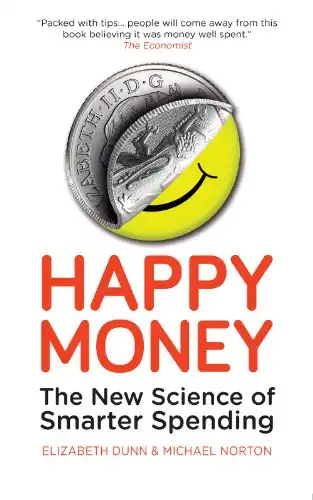This month’s book is Happy Money: The New Science of Smarter Spending by Elizabeth Dunn and Michael Norton.
So far I’ve read a lot of books on how to save money and manage money. This is the first book I’ve read on how to spend money.
Happy Money: The New Science of Smarter Spending is all about how to spend your money to maximize happiness.
Makes sense, right? We spend money every day, whether it’s on essentials like housing or food, or treats for ourselves and others. Even with things we think of as essential, we usually do have some form of control over what we buy. So why not learn to spend more wisely and get the biggest happiness bang for our buck?
The authors are professors who have spent years researching these topics, but the book doesn’t read like an academic text. It’s actually very funny, light and readable. It’s just over 150 pages long, but packed with fascinating info.
The authors found five main areas in which spending increases happiness:
- Buying experiences over material goods
- Keep things you love as treats
- Buying time (pay for things that will free up your time, and don’t buy things that will suck your time)
- Paying ahead of consumption
- Investing in others (whether donating to charity or spending on a friend)
Each claim is backed up with lots of scientific evidence from their own research and from studies around the world, as well as fun anecdotal evidence to illustrate their points.
There is a lot of really surprising information in this book. One point that I found amazing is that housing does not generally have an impact on happiness. Despite the fact that owning your own home is a major goal in the UK, US and many other countries, this huge financial commitment does not actually make people happier.
The authors argue that you are better off keeping housing costs as low as possible, and spending the difference on experiences such as travel and concerts.
Another interesting point is that paying upfront and waiting to enjoy your purchase actually increases your eventual enjoyment. In many cases, anticipation and planning gives us just as much pleasure as the actual event.
For this reason, you’re better off booking a holiday several months in advance rather than waiting for a cheap last-minute deal – and make sure you give yourself time to look at pictures of your destination and fantasize about the trip, so that you can enjoy it before you even leave.
Will I change my spending as a result of this book?
Yes – it really has made an impact on me! Even as I was still reading this book, I felt myself become more mindful with money.
In particular, after finishing Happy Money: The New Science of Smarter Spending I’ve made a decision to up my charity spending.
I do give a small amount to charity each month by direct debit, and I often thought I should give more, but never feel like I have enough to spare. But according to an experiment quoted in the book, spending as little as $5 on others created a measurable difference in the donors’ happiness. Also, people feel happier when they feel connected to the cause and can see the impact of their donation. I’ve decided I will now give little and often (£5 per week), but to causes such as Kiva campaigns that I’ve thought about and selected myself, rather than increasing my direct debits to larger organisations.
Boost My Budget rating
4/5
I would recommend Happy Money: The New Science of Smarter Spending to anyone who is interested in spending more mindfully and anyone who wants to know more about the psychology behind money!
Next month’s book is Nice Girls Don’t Get Rich by Lois P. Frankel.
Previous reviews:
- Your Money Or Your Life by Vicki Robin and Joe Dominguez
- Rich Dad Poor Dad by Robert T. Kiyosaki
- Millionaire Teacher by Andrew Hallam
- The Millionaire Next Door by Thomas J. Stanley and William D. Danko
- Get Rich, Lucky Bitch! by Denise Duffield-Thomas
- I Will Teach You to Be Rich by Ramit Sethi
- The Richest Man in Babylon by George S. Clason
- Broke Millennial by Erin Lowry
- The Total Money Makeover by Dave Ramsey
My to-read list:
- The Wealthy Barber by David Chilton
- The Minimalist Budget by Simeon Lindstrom
- Early Retirement Extreme by Jacob Lund Fisker
- The Automatic Millionaire by David Bach
- It’s Not About The Money by Brent Kessel
- The Millionaire Mind by Thomas J. Stanley
- A Random Walk Down Wall Street by Burton G. Malkiel
- Rich Bitch by Nicole Lapin
- Money, A Love Story by Kate Northrup
- You Are a Badass at Making Money by Jen Sincero
- The Millionaire Fastlane by M.J. DeMarco
- How to be a Financial Grownup by Bobbi Rebell
Any more recommendations? Let me know!

